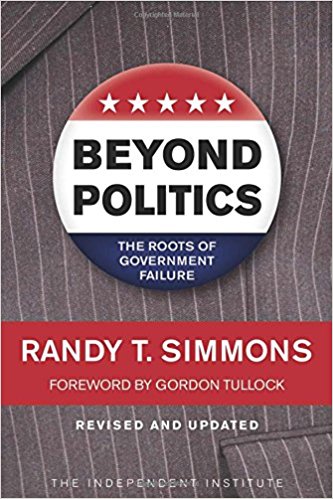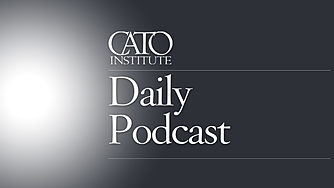
Economists use a whole host of tools to analyze the behaviors of consumers and companies in the private markets. Demand curves, marginal costs, profit-seeking…the list of tools and principles is long and complex. In the last half-century, it’s been something of a sport to identify “market failures”, where the market produced “inefficient” results -i.e., not as much good stuff and/or at a higher cost. The usual response is, “goverment needs to step in and regulate to fix this market failure.” End of story.
But who actually proved that goverments are more efficient and will produce better results? That is not a foregone conclusion. There is an entire field of economics, called “public choice” theory, that analyzes the public sector using the same tools and methodologies that economists have turned on the private sector for many decades. This book discusses some of the fascinating results of research in this field.
Those who argue market failure justifies goverment action don’t stop to ask: What incentives exist in government? Who wins and who loses? Are the actual outcomes different than those we hoped for? Do good intentions in government produce good results?
By examining these aspects of the public sector, we can come to understand where we can expect the public sector to succeed, and where it will likely fail, or at least produce a result less efficient (lower quality and/or more expensive) than the market would have. We often assume Unicorn Governance – the goverment is made of omniscient, infallible Angels of Altruism who’s only goal in existing is to make the world a better place. More sober analysis reveals something worse. In the words of economist Ronald Coase,
When I was the editor of The Journal of Law and Economics, we published a whole series of studies on regulation and its effects. Almost all the studies – perhaps all the studies – suggested that the results of regulation had been bad, that the prices were higher, that the product was worse adapted to the needs of consumers, than it otherwise would have been.
But wait, surely the electorate would not stand for this! Democracy would kick in, and we’d figure it all out, right? Democracy fixes everything, and is perfect too, right?
Inefficient and even destructive policies continue to exist and grow because virtually every policy can be defended as contributing some good to someone in need.
This is exactly why we need economic research. For any policy, it’s easy to find people helped and people hurt by the policy. The question is, does the help outweigh the hurt? Anecdotes are irrelevant. For this, you need detailed research. And the previous quote by Coase shows that the research is not very optimistic on the results of regulation. Yet voters continue to demand new laws. Why? The author cites a branch of research that applies economic thinking to the voting process, and finds
Even a voter fully informed about undesirable effects of policies can and will vote in favor of those policies…They choose to vote for irrational policies because their nearly worthless vote will not affect the outcome. They can at least feel good about their vote by casting it for the more moral position.
I feel this is a huge problem in the public sector. We like to vote for, and pursue and endorse, policies that “sound good”, and to push for things we “ought” to do; after all, it’s just the “good and moral thing to do.” Yet we never ask: what are the effects and results of these policies? Society is enormously complex, and it’s often the case that actions taken to help people end up hurting them – Mary Ruwart’s book Healing Our World does a great job at documenting and explaining this.
None of this bothers politicians at all. They are not there to solve problems – that is completely not in their best interest. What kind of world would it be for politicians (and journalists) if there was no war, no poverty, no disadvantaged classes to stick up for, no injustices to right…it would be boring, and we would not pay much attention to them (nor pay them big salaries). Their careers would be ruined.
Actually, stability in politics benefits neither the politician nor the beaurocrat; neither would have the wealth, income, power, nor status that accrue when there is more to do and nothing is done.
Just as “welfare” ecomomists love to document market failures, the book goes on to document goverment failures. There are four chapters entitled “Political Pursuit of Private Gain” (wonderful!), comprising the subjects of producer protection (cartels, monopolies, subsidies and tariffs), consumer protection, education, and the environment.
The most sobering aspect of the book was that all these lousy outcomes are not the result of “bad people” being in government – in fact the author repeats several times that most people in goverment are really trying to help and want to do good. It’s actually the structure of the system we have set up that guarantees poor outcomes – the incentives, and the punishment/reward systems. In one particularly enlightening section, the author explains why regulation to curb global warming will never succeed – not due to scientific reasons, but because the very structure of govermnent precludes success.
[My students] assume that the men of system [public sector elite] have bad intentions. I tell them that it is far worse than they imagined. The problem is not bad people, but people who are trying to do good! It is tempting to attack political activists, beaurocrats, and politicians as being evil, venal, or stupid. The reason it is tempting is that the solutions to the problems would be so simple. We would just need to elect better politicians or hire better-trained beaurocrats. But the truth is more difficult and far more frightening. Liberty gets run over by the tyranny of good intentions.
In the end, it seems the only possible answer is to limit the scope of goverment, to keep the government small so that the harms it can do are small. It seems the Founding Fathers really knew what they were talking about!
I’m not sure I can recommend this book for the general audience. It gets a bit technical in spots. There are a handful of demand-response curves. I think it’s aimed at an economics undergraduate level. But if you are interested in this subject, it’s a good read, and generally quite accessible. The ideas in the book are profound.

